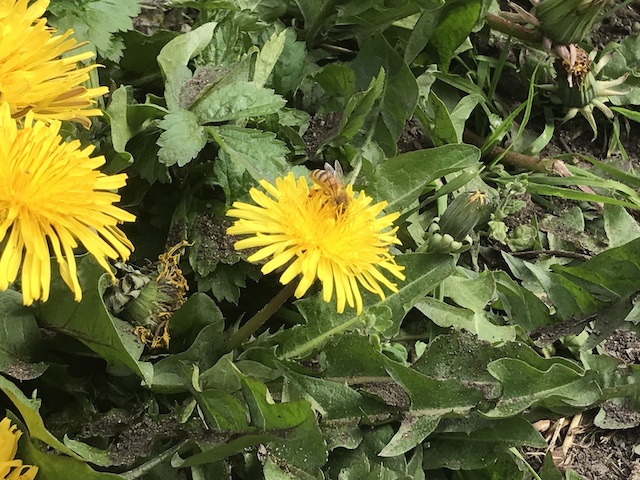Yesterday a council contractor rode up and down our street spraying weed killer on the pavements, grass and tree pits. I was dumbstruck. This is the biodiversity crisis manifesting literally on my doorstep. And at the same time double standards. Here you have a council that has led the way in the UK in declaring both climate and ecological emergencies. All the while its contractors are spraying weedkiller on its streets. For me this encapsulates the fundamental challenge of the ecological crisis: we understand at some high level that something must be done but we can’t translate that into what a thriving ecosystem looks like.
A little further up the street, I found a verge full of dandelions and nettles in flower. My daughter spotted one bee rummaging around in a bright yellow flower, and then another, and another. The dandelion’s flowers are amongst the earliest to provide insects with a dose of much needed nectar. When the weedkiller kicks in, what will happen to these insects? Where will they feed? How will they play their role in the ecosystem that incorporates our gardens and parks, and therefore the air that we breathe?
And how will our children know about insects if they can’t see them in our neighbourhoods? This is another death, a death of knowledge. If we can’t see them, we are less likely to value them. If we can’t conceive of them, we can’t imagine a world in which insect populations are back up to thriving levels.
Weed is a value-loaded word. Not wanted here. It is a word that disguises ignorance. Most plants that thrive in our ecosystems serve a purpose, playing a balanced role in our ecosystem. In the biodiversity crisis we should learn the value of something before we deign to call it a weed.
With regards to our street level ecocide, I have contacted the council and the waste contractors responsible for spreading the weed killer and asked them to justify their actions in the context of the ecological emergency that the council has declared. I’m waiting to hear back.


Leave a Reply